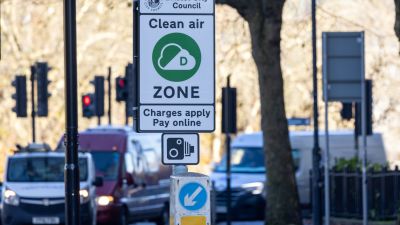Bristol Clean Air Zone brings in £2.2M a month - but is it working?

Watch as Seb Choudhury investigates whether Bristol's Clean Air Zone is working.
Bristol's Clean Air Zone (CAZ) has been controversial since before it was even introduced.
The zone sees drivers of diesel and older petrol cars charged £9 a day to enter parts of the city centre.
It is bringing in around £2.2million for Bristol City Council in payments and fines.
Campaigner Justyna Kowalska from ReactCAZ described the zone as a "scam".
"In my opinion, putting more fines and charges on people wont improve our air quality at all," she said.
"There are different solutions. I think personally it's punishing society."
But is the zone improving air quality?
According to Bristol City Council, when the scheme began there were 18 sites in the city centre that had levels of nitrogen dioxide that were above the legal limits of nitrogen dioxide. After a year of the CAZ being in place, the council says there are now six sits with illegal levels.
Professor Jo Barnes, from the University of the West of England, has almost 20 years of research experience in air quality management, policy and practice at local, national and international levels.
She told ITV News: "Here in Bristol in the first year of data, we've had a reduction in nitrogen dioxide of 12.7% inside the Clean Air Zone and 7.8% outside the Clean Air Zone, so it's quite a marked improvement."
The council has said there is still work to do in places like College Green, Colston Avenue and Lewins Mead - which are still above the legal limit of nitrogen dioxide.
Meanwhile, some people in the city say they've been hit hard by the scheme.Sean Donelley owns a pub in Bedminster just outside the zone and said his trade has been impacted.
"Firstly with bands, DJs, etc, they've got to come through the zone. They've got to come in at say 8pm and leave at 1am and pay the CAZ charge twice."
Ken Lintern says he racked up bills of nearly £1,000 after taking his daughter to hospital in Bristol.
While exemptions are available for some patients and visitors, he says his did not register.
"I got all sort of things like no, there's no exemption, you have to get a letter from the hospital saying you're there, I thought this is crazy."
Trainee nurse Amy Louise Patch found herself owing £4,000 after driving to the BRI as trainee nurse thinking she was exempt."I had bailiffs," she said. "I paid them about £1,500, they were quite abrupt and mean."
Amy and Ken did eventually have their fines written off - but many in the city are asking where the money from the scheme is going.
Councillor Heather Mach said the money is being spent on active travel improvements such as improving roads for cyclists, bus routes and general maintenance to make the city centre easier to travel.
"We cannot make profit on this scheme," she said. "It's all invested back into travel".
What are the dangers of nitrogen dioxide?
According to trainee GP Martin Valls Garcia, who campaigns against poor air quality, nitrogen dioxide is the most toxic air we can breathe.
The Bristol doctor said: "It affects our lungs and it creates an acid in the barrier between your lung and your blood which can cause worsening asthma attacks, and can even lead to lung cancer in the long term."
Who does it impact?
"It most effects young children under 14, but it can affect anyone, also the elderly are most likely to be effected," Dr Garcia said.
Does the Clean Air Zone make a difference?
Dr Garcia said: "The CAZ has resulted in a 10% reduction in air pollution, which is a step in the right direction.
"There's still dangerous levels around our hospitals, around our schools.
"Children deserve to live in a world where they can breathe clean air."